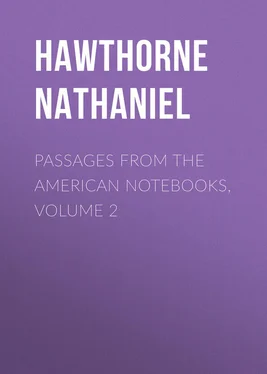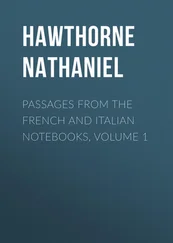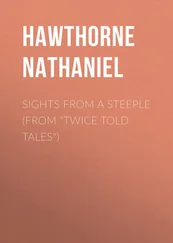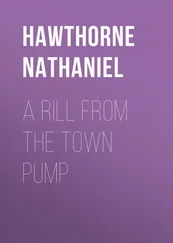Nathaniel Hawthorne - Passages from the American Notebooks, Volume 2
Здесь есть возможность читать онлайн «Nathaniel Hawthorne - Passages from the American Notebooks, Volume 2» — ознакомительный отрывок электронной книги совершенно бесплатно, а после прочтения отрывка купить полную версию. В некоторых случаях можно слушать аудио, скачать через торрент в формате fb2 и присутствует краткое содержание. Жанр: literature_19, foreign_antique, foreign_prose, на английском языке. Описание произведения, (предисловие) а так же отзывы посетителей доступны на портале библиотеки ЛибКат.
- Название:Passages from the American Notebooks, Volume 2
- Автор:
- Жанр:
- Год:неизвестен
- ISBN:нет данных
- Рейтинг книги:5 / 5. Голосов: 1
-
Избранное:Добавить в избранное
- Отзывы:
-
Ваша оценка:
- 100
- 1
- 2
- 3
- 4
- 5
Passages from the American Notebooks, Volume 2: краткое содержание, описание и аннотация
Предлагаем к чтению аннотацию, описание, краткое содержание или предисловие (зависит от того, что написал сам автор книги «Passages from the American Notebooks, Volume 2»). Если вы не нашли необходимую информацию о книге — напишите в комментариях, мы постараемся отыскать её.
Passages from the American Notebooks, Volume 2 — читать онлайн ознакомительный отрывок
Ниже представлен текст книги, разбитый по страницам. Система сохранения места последней прочитанной страницы, позволяет с удобством читать онлайн бесплатно книгу «Passages from the American Notebooks, Volume 2», без необходимости каждый раз заново искать на чём Вы остановились. Поставьте закладку, и сможете в любой момент перейти на страницу, на которой закончили чтение.
Интервал:
Закладка:
Beautiful now, while the general landscape lies in shadow, looks the summit of a distant hill (say a mile off), with the sunshine brightening the trees that cover it. It is noticeable that the outlines of hills, and the whole bulk of them at the distance of several miles, become stronger, denser, and more substantial in this autumn atmosphere and in these autumnal tints than in summer. Then they looked blue, misty, and dim. Now they show their great humpbacks more plainly, as if they had drawn nearer to us.
A waste of shrubbery and small trees, such as overruns the borders of the meadows for miles together, looks much more rugged, wild, and savage in its present brown color than when clad in green.
I passed through a very pleasant wood-path yesterday, quite shut in and sheltered by trees that had not thrown off their yellow robes. The sun shone strongly in among them, and quite kindled them; so that the path was brighter for their shade than if it had been quite exposed to the sun.
In the village graveyard, which lies contiguous to the street, I saw a man digging a grave, and one inhabitant after another turned aside from his way to look into the grave and talk with the digger. I heard him laugh, with the traditionary mirthfulness of men of that occupation.
In the hollow of the woods, yesterday afternoon, I lay a long while watching a squirrel, who was capering about among the trees over my head (oaks and white-pines, so close together that their branches intermingled). The squirrel seemed not to approve of my presence, for he frequently uttered a sharp, quick, angry noise, like that of a scissors-grinder's wheel. Sometimes I could see him sitting on an impending bough, with his tail over his hack, looking down pryingly upon me. It seems to be a natural posture with him, to sit on his hind legs, holding up his fore paws. Anon, with a peculiarly quick start, he would scramble along the branch, and be lost to sight in another part of the tree, whence his shrill chatter would again be heard. Then I would see him rapidly descending the trunk, and running along the ground; and a moment afterwards, casting my eye upward, I beheld him flitting like a bird among the high limbs at the summit, directly above me. Afterwards, he apparently became accustomed to my society, and set about some business of his own. He came down to the ground, took up a piece of a decayed bough (a heavy burden for such a small personage), and, with this in his mouth, again climbed up and passed from the branches of one tree to those of another, and thus onward and onward till he went out of sight. Shortly afterwards he returned for another burden, and this he repeated several times. I suppose he was building a nest, – at least, I know not what else could have been his object. Never was there such an active, cheerful, choleric, continually-in-motion fellow as this little red squirrel, talking to himself, chattering at me, and as sociable in his own person as if he had half a dozen companions, instead of being alone in the lonesome wood. Indeed, he flitted about so quickly, and showed himself in different places so suddenly, that I was in some doubt whether there were not two or three of them.
I must mention again the very beautiful effect produced by the masses of berry-bushes, lying like scarlet islands in the midst of withered pasture-ground, or crowning the tops of barren hills. Their hue, at a distance, is lustrous scarlet, although it does not look nearly as bright and gorgeous when examined close at hand. But at a proper distance it is a beautiful fringe on Autumn's petticoat.
Friday, October 22d. – A continued succession of unpleasant, Novembery days, and autumn has made rapid progress in the work of decay. It is now somewhat of a rare good fortune to find a verdant, grassy spot, on some slope, or in a dell; and even such seldom-seen oases are bestrewn with dried brown leaves, – which, however, methinks, make the short, fresh grass look greener around them. Dry leaves are now plentiful everywhere, save where there are none but pine-trees. They rustle beneath the tread, and there is nothing more autumnal than that sound. Nevertheless, in a walk this afternoon, I have seen two oaks which retained almost the greenness of summer. They grew close to the huge Pulpit Rock, so that portions of their trunks appeared to grasp the rough surface; and they were rooted beneath it, and, ascending high into the air, overshadowed the gray crag with verdure. Other oaks, here and there, have a few green leaves or boughs among their rustling and rugged shade.
Yet, dreary as the woods are in a bleak, sullen day, there is a very peculiar sense of warmth and a sort of richness of effect in the slope of a bank and in sheltered spots, where bright sunshine falls, and the brown oaken foliage is gladdened by it. There is then a feeling of comfort, and consequently of heart-warmth, which cannot be experienced in summer.
I walked this afternoon along a pleasant wood-path, gently winding, so that but little of it could be seen at a time, and going up and down small mounds, now plunging into a denser shadow and now emerging from it. Part of the way it was strewn with the dusky, yellow leaves of white-pines, – the cast-off garments of last year; part of the way with green grass, close-cropped, and very fresh for the season. Sometimes the trees met across it; sometimes it was bordered on one side by an old rail-fence of moss-grown cedar, with bushes sprouting beneath it, and thrusting their branches through it; sometimes by a stone-wall of unknown antiquity, older than the wood it closed in. A stone-wall, when shrubbery has grown around it, and thrust its roots beneath it, becomes a very pleasant and meditative object. It does not belong too evidently to man, having been built so long ago. It seems a part of nature.
Yesterday I found two mushrooms in the woods, probably of the preceding night's growth. Also I saw a mosquito, frost-pinched, and so wretched that I felt avenged for all the injuries which his tribe inflicted upon me last summer, and so did not molest this lone survivor.
Walnuts in their green rinds are falling from the trees, and so are chestnut-burrs.
I found a maple-leaf to-day, yellow all over, except its extremest point, which was bright scarlet. It looked as if a drop of blood were hanging from it. The first change of the maple-leaf is to scarlet; the next, to yellow. Then it withers, wilts, and drops off, as most of them have already done.
October 27th. – Fringed gentians, – I found the last, probably, that will be seen this year, growing on the margin of the brook.
1842. – Some man of powerful character to command a person, morally subjected to him, to perform some act. The commanding person suddenly to die; and, for all the rest of his life, the subjected one continues to perform that act.
"Solomon dies during the building of the temple, but his body remains leaning on a staff, and overlooking the workmen, as if it were alive."
A tri-weekly paper, to be called the Tertian Ague.
Subject for a picture, – Satan's reappearance in Pandemonium, shining out from a mist, with "shape star-bright."
Five points of Theology, – Five Points at New York.
It seems a greater pity that an accomplished worker with the hand should perish prematurely, than a person of great intellect; because intellectual arts may be cultivated in the next world, but not physical ones.
To trace out the influence of a frightful and disgraceful crime in debasing and destroying a character naturally high and noble, the guilty person being alone conscious of the crime.
A man, virtuous in his general conduct, but committing habitually some monstrous crime, – as murder, – and doing this without the sense of guilt, but with a peaceful conscience, – habit, probably, reconciling him to it; but something (for instance, discovery) occurs to make him sensible of his enormity. His horror then.
Читать дальшеИнтервал:
Закладка:
Похожие книги на «Passages from the American Notebooks, Volume 2»
Представляем Вашему вниманию похожие книги на «Passages from the American Notebooks, Volume 2» списком для выбора. Мы отобрали схожую по названию и смыслу литературу в надежде предоставить читателям больше вариантов отыскать новые, интересные, ещё непрочитанные произведения.
Обсуждение, отзывы о книге «Passages from the American Notebooks, Volume 2» и просто собственные мнения читателей. Оставьте ваши комментарии, напишите, что Вы думаете о произведении, его смысле или главных героях. Укажите что конкретно понравилось, а что нет, и почему Вы так считаете.












